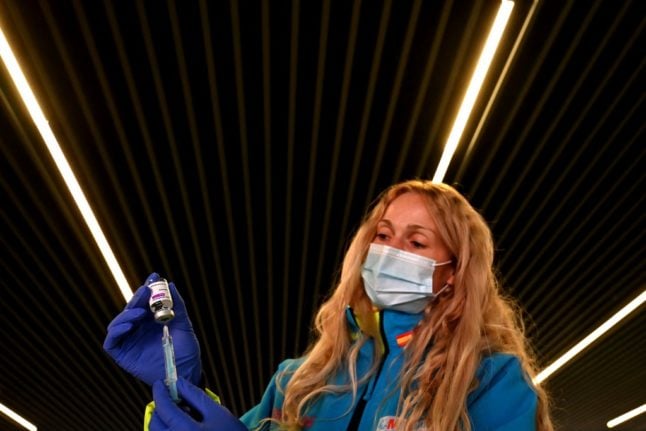Coronavirus in Spain: a round-up of the most important news ahead of Easter

There’s a lot of Covid-19 news in Spain in the lead up to the Easter break, with everything from restrictions to infection rates deciding the Spanish government’s next moves. Here are six key facts you need to know about the current state of affairs.
Health Ministry considering tighter Easter restrictions
The interiors of bars and restaurants in the autonomous communities of Madrid, Catalonia, the Basque Country, Navarra, Asturias, Ceuta and Melilla will have to close, if the government’s proposal to toughen restrictions is successful. The proposal states that any region that has a cumulative incidence rate of more than 150 cases per 100,000 inhabitants would have to close the interiors of their bars and restaurants for 14 days. Several regions are against the new proposal, however, particularly the health ministers for Madrid and Galicia, who have both voiced their disagreement. No decision has been made yet, so bars and restaurants can stay open under current regional restrictions.
READ ALSO: UPDATE: These are the new restrictions for regions across Spain
Tourists are already arriving; EU has asked for ‘coherence’
The European Commission has called on Spain for ‘coherence’ in its policies regarding domestic and international travel restrictions. Already, German tourists have been arriving in Spain for the Easter holidays, while residents in Spain are prohibited from leaving their province or region. “The recommendation clearly states that, given that transmission and risk are similar for national and cross-border journeys, member states should ensure there is coherence between the measures applied to the two types of journey,” the EU spokesperson for rule of law, Christian Wigand, told Spain on Monday, March 22nd.
Rules frustrate many Spaniards who can’t travel
Many Spaniards and Spanish residents are frustrated that they will be unable to travel to other regions or second homes over Easter, with all of the country’s autonomous communities, minus the Canaries, having agreed to close their borders. However, people from other EU countries will be able to travel and visit their second homes as Spain’s borders remain open to other EU residents. Spain’s chief epidemiologist Fernando Simón told journalists that it’s “incongruous” that foreign tourists and second homeowners can travel to Spain but residents won’t be able to cross regional borders during the Easter break. “How would you explain to Spaniards that foreigners can come to their second homes in Spain and they can come on holiday but Spaniards cannot go to their second homes?”, he said.
UK variant most dominant strain in Spain now
The new Covid-19 variant that was first detected in the UK, now accounts for half of all new cases said Spanish Health Minister Carolina Darias on Wednesday, March 24th. The variant, known as B.1.1.7, is thought to be around 30 to 70 percent more contagious than the previous strain that was being spread in Spain. Darias warned that there will be a “possible change in trend” in Spain as the Covid incidence rates begin to rise once again.

AstraZeneca vaccine rollout resumes
Spain resumed vaccinating with AstraZeneca on Wednesday, March 24th after the temporary suspension due to fears of blood clots. The Spanish Health Ministry restarted the rollout after the European Medicines Agency (EMA) said that the vaccine was “safe and effective” and that “its benefits in protecting people from Covid-19 hugely outweigh the risks”. After the news, Spain’s Inter-Territorial Council of the National Health System decided on Monday, March 22nd to extend the use of the AstraZeneca vaccine to those up to 65 years old, instead of those up to 55, which was their previous policy.
The AstraZeneca vaccine in Spain is mainly being used on key workers such as teachers, police and those healthcare workers not working directly with Covid-19 patients.
READ ALSO: IN STATS: How the AstraZeneca suspension is affecting Spain's vaccine rollout
The incidence rate rises in 13 regions
The Covid-19 cumulative incidence rate has risen in 13 of Spain’s 17 autonomous communities after the steady decline in recent weeks, causing concern for many health authorities, ahead of Easter. According to the latest data published by the Ministry of Health, cases have risen in Navarra by 8.3 percent, in La Rioja by 4.95 percent, in the Basque Country by 3.4 percent and in Madrid by 3.2 percent. The other nine communities have incidence rates that have risen between 0.1 percent and 2.3 percent.
Comments
See Also
Health Ministry considering tighter Easter restrictions
The interiors of bars and restaurants in the autonomous communities of Madrid, Catalonia, the Basque Country, Navarra, Asturias, Ceuta and Melilla will have to close, if the government’s proposal to toughen restrictions is successful. The proposal states that any region that has a cumulative incidence rate of more than 150 cases per 100,000 inhabitants would have to close the interiors of their bars and restaurants for 14 days. Several regions are against the new proposal, however, particularly the health ministers for Madrid and Galicia, who have both voiced their disagreement. No decision has been made yet, so bars and restaurants can stay open under current regional restrictions.
READ ALSO: UPDATE: These are the new restrictions for regions across Spain
Tourists are already arriving; EU has asked for ‘coherence’
The European Commission has called on Spain for ‘coherence’ in its policies regarding domestic and international travel restrictions. Already, German tourists have been arriving in Spain for the Easter holidays, while residents in Spain are prohibited from leaving their province or region. “The recommendation clearly states that, given that transmission and risk are similar for national and cross-border journeys, member states should ensure there is coherence between the measures applied to the two types of journey,” the EU spokesperson for rule of law, Christian Wigand, told Spain on Monday, March 22nd.
Rules frustrate many Spaniards who can’t travel
Many Spaniards and Spanish residents are frustrated that they will be unable to travel to other regions or second homes over Easter, with all of the country’s autonomous communities, minus the Canaries, having agreed to close their borders. However, people from other EU countries will be able to travel and visit their second homes as Spain’s borders remain open to other EU residents. Spain’s chief epidemiologist Fernando Simón told journalists that it’s “incongruous” that foreign tourists and second homeowners can travel to Spain but residents won’t be able to cross regional borders during the Easter break. “How would you explain to Spaniards that foreigners can come to their second homes in Spain and they can come on holiday but Spaniards cannot go to their second homes?”, he said.
UK variant most dominant strain in Spain now
The new Covid-19 variant that was first detected in the UK, now accounts for half of all new cases said Spanish Health Minister Carolina Darias on Wednesday, March 24th. The variant, known as B.1.1.7, is thought to be around 30 to 70 percent more contagious than the previous strain that was being spread in Spain. Darias warned that there will be a “possible change in trend” in Spain as the Covid incidence rates begin to rise once again.

AstraZeneca vaccine rollout resumes
Spain resumed vaccinating with AstraZeneca on Wednesday, March 24th after the temporary suspension due to fears of blood clots. The Spanish Health Ministry restarted the rollout after the European Medicines Agency (EMA) said that the vaccine was “safe and effective” and that “its benefits in protecting people from Covid-19 hugely outweigh the risks”. After the news, Spain’s Inter-Territorial Council of the National Health System decided on Monday, March 22nd to extend the use of the AstraZeneca vaccine to those up to 65 years old, instead of those up to 55, which was their previous policy.
The AstraZeneca vaccine in Spain is mainly being used on key workers such as teachers, police and those healthcare workers not working directly with Covid-19 patients.
READ ALSO: IN STATS: How the AstraZeneca suspension is affecting Spain's vaccine rollout
The incidence rate rises in 13 regions
The Covid-19 cumulative incidence rate has risen in 13 of Spain’s 17 autonomous communities after the steady decline in recent weeks, causing concern for many health authorities, ahead of Easter. According to the latest data published by the Ministry of Health, cases have risen in Navarra by 8.3 percent, in La Rioja by 4.95 percent, in the Basque Country by 3.4 percent and in Madrid by 3.2 percent. The other nine communities have incidence rates that have risen between 0.1 percent and 2.3 percent.
Join the conversation in our comments section below. Share your own views and experience and if you have a question or suggestion for our journalists then email us at [email protected].
Please keep comments civil, constructive and on topic – and make sure to read our terms of use before getting involved.
Please log in here to leave a comment.